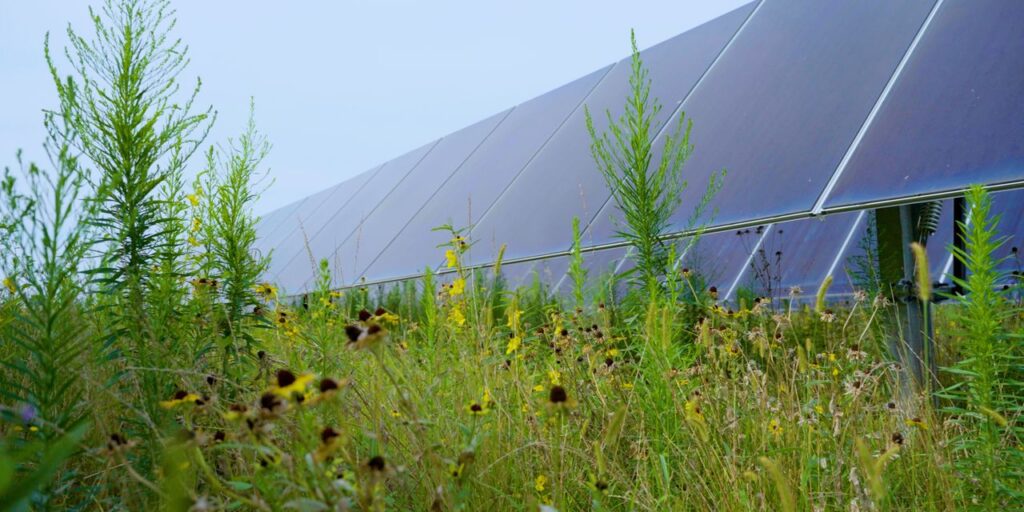Retail giant Amazon.com has been committed in recent years to buying electricity produced by utility-sized renewable energy, a key step in offsetting its large carbon-emissions footprint due in part to speedy deliveries. And Amazon’s efforts show the Seattle-based global e-tailer sees value in putting energy projects smack in the middle of the U.S.
On Thursday, Amazon
AMZN,
released new economic data that it says demonstrates how the company’s solar and wind farms in Ohio, for instance, have positively impacted local communities and the state’s economy.
Amazon’s commitment to renewable energy in that state has generated an estimated $1.6 billion of investment and contributed $854 million to the state’s gross domestic product (GDP) from 2014 through 2022. It also supported an estimated 3,560 full-time equivalent jobs in Ohio in 2022 alone.
This data was identified through a new economic model developed by Amazon that follows guidance from the National Renewable Energy Laboratory (NREL) and was validated by the independent economic advisery firm Oxford Economics.
To date, Amazon has announced 17 solar projects
TAN
and one wind project in Ohio, including Yellowbud Solar Farm, which is near Columbus and recently became operational.
The project led to a career change for local Allen Hull, who is solar-plant manager at Yellowbud. After serving in the U.S. Marine Corps, Hull returned to work in the area’s paper mill like his parents and grandparents. But after more than three decades at the mill, Hull decided to apply to be the manager of the new solar farm.
“It was a big change at 56 years old, not only changing jobs, but changing careers, and changing companies,” Hull said in a release. “Yellowbud is an injection, almost a permanent injection of income into our township, county and school system and it’s good to be a part of those things.”
Ohio: An economic and political bellwether for the energy transition
Of the latest project, in Ohio, Nat Sahlstrom, Amazon’s head of energy, water and sustainability, said the company is not done when it comes to projects in places like Ohio.
“We’re eager to continue contributing to Ohio’s economic and environmental goals as part of Amazon’s commitment to become a more sustainable business,” Sahlstrom said.
Ohio, once part of the country’s major industrial belt and, because of an economic shift favoring imports that has hurt its manufacturing pedigree, a state that tends to vacillate between blue, or Democrat-favored, and red, pro-Republican, politics. As such, it’s often a key state in major elections and could serve as a bellwether as more of the country, including Republican-led states, taps federal dollars for a green-energy migration. Ohio, save for Columbus and major urban counties, went full-on red in the 2020 election.
And it’s not just Ohio that has a political dilemma when it comes to politics and a greener future.
Billions of dollars of new clean energy investment has been announced for solar, electric vehicle and battery manufacturing in Georgia and other southern states since the 2022 passage of the Inflation Reduction Act (IRA), a mostly Democrat-led effort that had no Republican votes, in large part because of its price tag.
This scope of green economic development is leading to a swathe of red states like Georgia being nicknamed the “battery belt.” In fact, the battery belt and other Republican-led states have been claiming the bulk of IRA dollars, according to an analysis by American Clean Power. Republican-held congressional districts are now home to more than 80% of all utility-scale wind, solar farms and battery projects currently under development, the trade group says.
Largest corporate buyer of renewable energy
It’s also true that Republicans have said they want a wide portfolio of U.S.-generated energy, which will mean the continuation of drilling for oil
CL00,
and natural gas, while solar, wind, hydrogen and nuclear ramp up. And, Republicans, by and large, want the private sector, like Amazon, to take the lead on investment in greener energy and technology.
‘Conservatives, unfortunately, do a better job of telling people what we don’t like versus what we do like when it comes to slowing global warming,’ Utah Rep. John Curtis, a Republican, told MarketWatch in a recent interview.
Read more: How a conservative group sees a climate-focused energy transition that includes gas and nuclear
Globally, Amazon’s wind and solar farms helped generate $12.6 billion in investments and contributed more than $5.4 billion in global GDP over the same timeframe, supporting 39,000 jobs in 2022, according to the new economic assessment.
Amazon has felt the pressure from customers and investors to reveal its environmental impact, long ahead of regulations demanding such data expected from the Securities and Exchange Commission yet this year. Human-made carbon and methane emissions, among other factors, are warming up Earth’s atmosphere at an accelerating rate, leading to dangerous and costly weather extremes and warming, acidifying oceans that threaten food sources and coastlines.
Read: It’s official: This summer was the hottest on record
In its annual sustainability report issued in July, Amazon said its activities emitted the equivalent of 71.27 million metric tons of carbon dioxide last year. That was down 0.4% from 2021, when it reported a carbon footprint of 71.54 million metric tons. Its emissions are still up roughly 40% from 2019, the year Amazon first began disclosing its carbon footprint.
The company also reported that its carbon intensity, which measures emissions per dollar of sales, fell 7% between 2021 and 2022, and has fallen 24% since 2019.
Scope 2 emissions, which accounts for emissions from electricity use, dropped 29% between 2021 and 2022, the company said. Amazon said its scope 3 emissions, which includes indirect sources such as building construction and third-party transportation, fell 0.7% in 2022 after three consecutive years of increases.
Amazon has spent millions on wind and solar projects to power some of its warehouses, data centers and offices, and has achieved the status of the world’s largest corporate buyer of renewable energy, according to Bloomberg New Energy Finance. Amazon has also pledged for its entire business to be net-zero-carbon by 2040. Net-zero pledges, undertaken by companies and countries alike, generally require a sharp reduction in using coal, oil and natural gas
NG00,
but can also involve, for instance, participating in carbon-absorbing tree-planting projects or the purchase of carbon permits from companies who produce less pollution.
As of the end of 2022, 90% of the electricity Amazon used to power its operations was from renewable energy resources.
Baked-in demand
One way Amazon aims to generate economic activity around its solar and wind projects is using long-term contracts known as Power Purchase Agreements (PPAs). Through these financial agreements, which were used in the Ohio project, Amazon makes commitments to buy the electricity produced by the future renewable energy projects, which allow wind and solar farm developers to raise funds, purchase equipment and construct the projects without direct costs to local energy users.
Then, as these projects get off the ground, their creation lifts demand for the manufacturing of parts, and local construction labor. It also boosts sales at local restaurants, hotels and stores during construction. After completion, the projects require hiring solar farm managers or wind turbine technicians and other support staff.
Amazon, which has faced controversy in recent years amid reports of stifling union organization at its workplaces, also has 17 fulfillment and sorting centers, 16 delivery stations, 12 Whole Foods Market locations, two Prime Now fulfillment centers, and one air hub in Ohio.
Read: Could a break-up of Amazon be good for the stock? Analysts weigh in after FTC lawsuit.
Read the full article here













